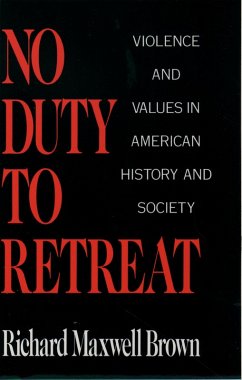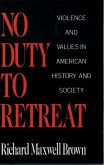In 1865, Wild Bill Hickok killed Dave Tutt in a Missouri public square in the West's first notable "walkdown." One hundred and twenty-nine years later, Bernhard Goetz shot four threatening young men in a New York subway car. Apart from gunfire, what could the two events possibly have in common? Goetz, writes Richard Maxwell Brown, was acquitted of wrongdoing in the spirit of a uniquely American view of self-defense, a view forged in frontier gunfights like Hickok's. When faced with a deadly threat, we have the right to stand our ground and fight. We have no duty to retreat.
No Duty to Retreat offers an engrossing account of how this idea of self-defense emerged, focusing in particular on the gunfights of the frontier and their impact on our legal traditions. The right to stand one's ground, Brown tells us, appeared relatively recently. Under English common law, the threatened party had a legal duty to retreat "to the wall" before fighting back. But from the nineteenth century on, such authorities as Justice Oliver Wendell Holmes rejected this doctrine as unsuited to both the American mind and the age of firearms. Brown sketches the influence of frontier violence, demonstrating the tremendous impact of the famous gunmen and the prevalence of what he calls "grassroots gunfighters"--unsung men who resorted to their guns at a moment's notice. These duels, ambushes, and firefights, he writes, were more than personal vendettas: They were part of a "Western Civil War of Incorporation," pitting gunmen--usually Republicans and Unionists, who sided with the expanding banks, railroads, and businesses--against cowboys and independent farmers, who were often Democrats sympathizing with the Confederacy. Brown examines the gunfight near the O.K. Corral in this light, showing how it was a climax of tensions between Tombstone's Republican businessmen (represented by Wyatt Earp) and the county's cowboys (led by the Clantons and McLaurys). He also looks at such lesser-known battles as the Mussel Slough war, in which resisting farmers, imbued with the no-retreat ethic, fought for their independent lifestyle against encroaching rail barons. This Civil War of Incorporation fed the violence of the West and reinforced the legal doctrine of "no duty to retreat." The frontier days are long past, but Brown shows how the ethic of no retreat continues to shape everything from our entertainment to our foreign policy (including President Bush's "line drawn in the sand") to our politics to cases like that of Bernhard Goetz. Though challenged as never before by the values of peace and social activism, it remains a central theme in American thought and character.
Dieser Download kann aus rechtlichen Gründen nur mit Rechnungsadresse in A, B, BG, CY, CZ, D, DK, EW, E, FIN, F, GR, HR, H, IRL, I, LT, L, LR, M, NL, PL, P, R, S, SLO, SK ausgeliefert werden.









